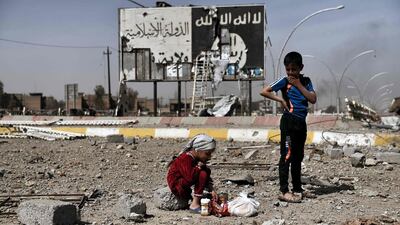Launched on a single transmitter in March 2015, Radio Al Ghad, or Tomorrow, started out broadcasting music from the nearby foothills into the city where Isil had steadily imposed its monochrome regime.
In a major survey of Al Ghad’s work, the Royal United Services Institute has found that its subsequent role in binding together opposition behind the lines to the Isil fighters running the city was crucial to Mosul’s liberation two years later.
Pointing to the post-liberation frictions between the Iraqi military forces in the city and its population, the author, ex-British Army officer Michael Stevens, said the lingering myths from the battle must be dispelled. “If the sectarian wounds of Mosul are to heal rather than fester, the story of civilian resistance to [Isil] must be told,” he said.
The key development that transformed Al Ghad’s importance as Isil’s “only rival for the airwaves” was the establishment of a phone-in show six months after broadcasts were launched.
“From that point the station began to receive calls from inside the caliphate,” the report issued Tuesday said. “Radio Al Ghad filled a void that was created by the increasing restrictions on satellite television, internet and mobile phone access – becoming a unique means for community interaction.
“Many were afraid to call, but female residents led the way.”
At that point, Isil was operating a feared system of moral policing through the Al Hesba police, which enforced the group’s codes of social and private behaviour. The women had more scope to air their views as they were anonymously confined to their homes.
When Isil blocked the signal in 2016, the management had enough confidence to establish a new transmitter beacon and a different frequency. The report dubs the station analogue electronic warfare in a digital age.
As the daily log of phone calls rose through a 100 contacts a day threshold, the station became a reference point for residences dedicated to resistance to Isil rule. “Resistance groups had been operating under a number of names; now through the radio station they became simply Muqawima Al Mosul (the Mosul Resistance) or Rijaal Al Muqawima (the Resistance Men), with its logo being the Arabic letter meem (‘M’).”
With an identity forged through communications, the logo began to appear on the city’s streets in 2016. “Inspired by the radio station, and reinforced by social media, resistance activists began to spray ‘meems’ on the walls of the city,” Mr Stevens added.
That display of activity encouraged more and more to form their own underground units. “The unified ‘meem’ brand now enabled the transformation of small cells of active, violent fighters and a large body of passive, non-violent listeners into a network connected by a common identity.”
As the battle of Mosul intensified into 2017, Al Ghad became a means of cooperation across the front line as Iraqi soldiers joined the discussions.
“Soldiers called in to the station, and so were able to tackle the residents’ real fear of sectarian
cleansing, which had been fed by [Isil’s] propaganda and the imminent threat of Shia militias, “ he wrote. “Previously irrelevant leaflet drops at last tapped into Mosul’s reality, with the meem symbol portrayed as a noose strangling the [Isil] flag.”
The station even allowed exchanges that could have prevented needless loss of civilian life as artillery battles raged in the conquest of the west of the city. “Al Ghad was taking calls from civilians sheltering yards from incoming ordnance, asking for their buildings to be spared,” the report said. “The radio station passed the information from these calls to the security forces on a 24/7 watch. Al Ghad also broadcast safety information, such as where to shelter during the bombardment, and how to avoid being mistaken as a combatant.
After the battle, the station is one of the focal point of efforts to bind the city back together. “A social media group called Friends of Radio Al Ghad has begun to organise social assistance activities,” Mr Stevens said. “The group has more than 470,000 followers on Facebook, 200,000 more than the station itself.


